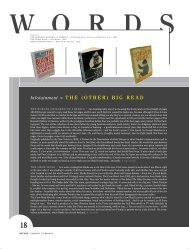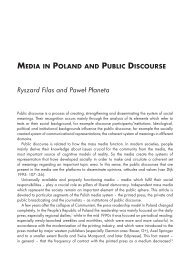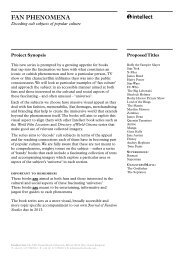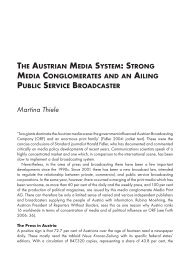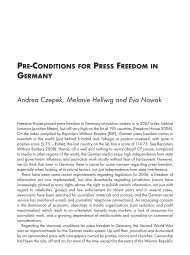Anthem - Intellect
Anthem - Intellect
Anthem - Intellect
You also want an ePaper? Increase the reach of your titles
YUMPU automatically turns print PDFs into web optimized ePapers that Google loves.
Signifying Europe<br />
in mind that the tune of the Ode to Joy, from the last movement of<br />
Beethoven’s Ninth Symphony, had frequently been performed as a<br />
European anthem by local communities in particular, the Committee<br />
considered it preferable to give official approval to this incipient<br />
tradition and to propose the prelude to the Ode to Joy.<br />
An arrangement of the work was in fact made for the Belgian<br />
section of the Council of European Municipalities in 1961 and<br />
published by Schott Frères of Brussels; this could be used for<br />
reference purposes.<br />
As regards the words for an anthem some doubt was felt, mainly<br />
with regard to the words of the Ode to Joy, which were in the nature of<br />
a universal expression of faith rather than a specifically European one.<br />
Members also wondered whether any words acknowledged as<br />
‘European’ could ever be translated into another language and accepted<br />
as such by the other linguistic groups of the European family.<br />
The Committee therefore preferred, for the time being, to propose<br />
only the tune for a European anthem, without words, and to allow<br />
some time to pass. One day perhaps some words will be adopted<br />
by the citizens of Europe with the same spontaneity as Beethoven’s<br />
eternal melody has been. 346<br />
While the melody was widely accepted, Schiller’s lyrics were an obstacle. One objection<br />
was that any words would be bound to a single linguistic community and thus run into<br />
conflict with the unifying purpose of the anthem. The other main objection was even<br />
more fascinating, as it questioned the validity of a universalist text to identify Europe:<br />
Beethoven’s version of Schiller’s words was thus deemed to be too little European and<br />
too globally inclusive to signify a specifically European identity, whereas the music itself<br />
appeared to have passed the test as being specifically European enough to serve this<br />
purpose. Skipping the words altogether became the easiest way out.<br />
The 10 June 1971 Report by the Consultative Assembly of the Council of Europe<br />
on a European anthem from which this long quote derives was thus of the opinion<br />
that ‘it would be preferable to select a musical work representative of European<br />
genius and whose use on European occasions is already becoming something of a<br />
tradition’. 347 In a long ‘explanatory note’, the Assembly’s rapporteur, Mr René Radius,<br />
gave a background to the anthem plans and confronted a counter-argument ‘that to<br />
propose a European anthem is too bold an undertaking for poli ticians’. He argued that<br />
this was part of the key task of ‘spreading the European idea’, not least in face of the<br />
expected enlargement of the European Communities, where ‘the Council of Europe<br />
is required by its Statute to propagate the ideal of European unity and thus to prepare<br />
the citizens of Europe to live together in a spirit of solidarity and fraternity’, and ‘to<br />
156




